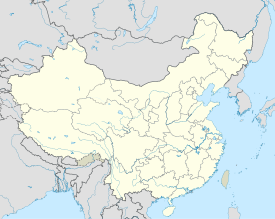Suzhou
Suzhou (Wu Chinese [sou˥ tseu˨˩ ]) is a major city in southeastern Jiangsu Province of East China. It is about 100 km (62 mi) northwest of Shanghai.
Suzhou
苏州市 | |
|---|---|
 Landmarks of Suzhou — top left: Humble Administrator's Garden; top right: Yunyan Pagoda in Tiger Hill; middle: Skyline of Jinji Lake; bottom left: Changmen Gate in night; bottom right: Shantang Canal | |
 Location in Jiangsu | |
| Coordinates: 31°18′N 120°36′E / 31.300°N 120.600°E | |
| Country | People's Republic of China |
| Province | Jiangsu |
| County-level divisions | 11 |
| Established | 514 BC |
| Government | |
| • Type | Prefecture-level city |
| • Party Secretary | Zhou Naixiang |
| • Mayor | Qu Futian |
| Area | |
| • Prefecture-level city | 8,488.42 km2 (3,277.40 sq mi) |
| • Land | 6,093.92 km2 (2,352.88 sq mi) |
| • Water | 2,394.50 km2 (924.52 sq mi) |
| • Urban | 2,743 km2 (1,059 sq mi) |
| Population (2015) | |
| • Prefecture-level city | 10,658,000 |
| • Density | 1,300/km2 (3,300/sq mi) |
| Demonym | Suzhounese |
| Time zone | UTC+8 (Beijing Time) |
| Postal code | 215000 |
| Area code | 512 |
| ISO 3166 code | CN-JS-05 |
| GDP (2016) |
CNY 1.55 trillion
CNY 145,205
|
| HDI (2015) | 0.894 very high[2] |
| City flower | Osmanthus |
| City tree | Camphor laurel |
| Regional dialect | Wu: Suzhou dialect |
| License plate prefix | 苏E and 苏U[3] |
| Website | www |
It is the second largest city in the province, after its capital Nanjing. The city is located on the lower reaches of the Yangtze River and the shores of Lake Tai and belongs to the Yangtze River Delta region. Suzhou is a prefecture-level city with a population of 4.33 million in its city proper, and a total resident population (as of 2013[update]) of 10.58 million in its administrative area.
Its urban population grew at a rate of 6.5% between 2000 and 2014, which is the highest among cities with more than 5 million people.[4][5]
Education
changeReferences
change- ↑ "Table showing land area and population". Suzhou People's Government. 2003. Archived from the original on 2007-12-02. Retrieved 2007-09-07.
- ↑ Calculated using data from Suzhou Statistics Bureau. Life Expectancy Index = 0.9672, Education Index = 0.8244, Income Index = 0.896. Refs:
- Suzhou Bureau of Statistics (苏州市统计局). 2016年苏州市情市力 (PDF). Archived from the original (PDF) on 2017-03-14. Retrieved 2017-03-13.
- 新建改扩建410所学校 苏州教育有"国际范". Tencent. Archived from the original on 2017-03-14. Retrieved 2017-03-13.
- 苏州人均期望寿命高于北京上海 癌症仍是"头号杀手". 城市商报. 2016-04-22. Archived from the original on 2017-10-03. Retrieved 2016-10-05.
- ↑ 苏U号牌来了!苏州将成江苏首个启用双号牌的城市. 交汇点. 2018-10-24. Archived from the original on 2018-10-24. Retrieved 2018-10-24.
- ↑ United Nations, Department of Economic and Social Affairs, Population Division. "World Urbanization Prospects: The 2014 Revision" (PDF). Retrieved 1 January 2015.
{{cite web}}: CS1 maint: multiple names: authors list (link) - ↑ Elizabeth MacBride (22 December 2014). "Keep an eye on these emerging market cities". CNBC. Retrieved 1 January 2015.
